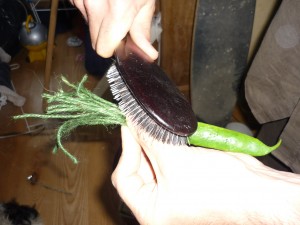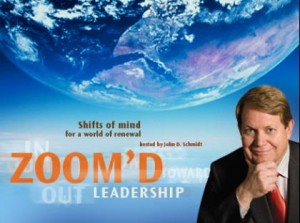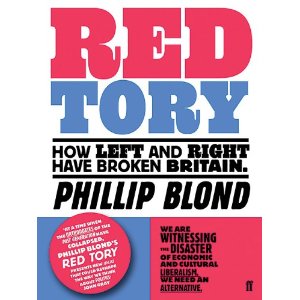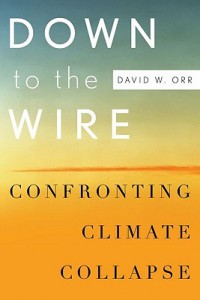Transition Culture has moved
I no longer blog on this site. You can now find me, my general blogs, and the work I am doing researching my forthcoming book on imagination, on my new blog.
Come find me at robhopkins.net
24 Mar 2010

A firm brush and the fibres soon start to separate
Here is a top tip I wrote which appears in the latest edition of Permaculture Magazine, out now.
“One of the key frustrations about the end of the summer months is stringy runner beans. You nurture them, weed them, give them a frame to climb up, yet by the end of the season, many of them are tough, fibrous, and inedible. Last summer, I sat with a large trug of large, stringy runners, thinking of a use for them other than the compost heap. The solution came to me after reading John Paul Flintoff’s ‘Through the Eye of a Needle‘. I have discovered a way of extracting those fibres that prove so hard to digest, in a way that they are actually useful. Here’s how.
Read more»
23 Mar 2010
 I recently did an interview for the radio show Zoom’d Leadership with John D. Schmidt on the Voice America Talk Radio Network. It was very enjoyable, and I think the final result turned out well. You can hear it here, and download the podcast also.
I recently did an interview for the radio show Zoom’d Leadership with John D. Schmidt on the Voice America Talk Radio Network. It was very enjoyable, and I think the final result turned out well. You can hear it here, and download the podcast also.
Read more»
22 Mar 2010

A while ago, at a Soil Association event in London, I found myself on a panel with Phillip Blond of ResPublica, and was really impressed by his insightful thinking on how politics might best enable the process of localisation. Phillip’s book. ‘Red Tory’ is due to be published in a couple of weeks, and I was delighted that Phillip agreed to do an interview about his thinking.
So, Phillip, perhaps I might start by asking what is ResPublica?
ResPublica was launched officially by David Cameron last year, and what we’re really about is trying to produce, or mainstream, genuinely radical new ideas for changing the current dispensation. In our view the agendas of the old Left and the old Right, those of the last 30 years, have run out of steam. Some were necessary at some point, but neither are delivering now and we need a new political settlement and a new middle ground, and we are interested in crafting with others that vision and talking about how to realise it. That’s really what Respublica is about, our strap line is “changing the terms of the debate” and that’s what we’d like to do”.
Read more»
19 Mar 2010
 As somebody who has lived a long time immersed in climate data and environmental information and has lived with your nose up against the reality of that for a long time, how do you cope with that? What are your coping mechanisms? Knowing what you know, how does it affect how you live your life?
As somebody who has lived a long time immersed in climate data and environmental information and has lived with your nose up against the reality of that for a long time, how do you cope with that? What are your coping mechanisms? Knowing what you know, how does it affect how you live your life?
There is something to TS Elliot’s statement that humankind cannot bear too much reality. Not totally, but clearly if you come down with cancer or heart disease you want the truth. Ecological truths are harder for us to absorb and the pain of the world, not many of us can face this. A Canadian wildlife guy, John Livingstone, wrote some brilliant stuff, he really felt nature, and when he saw what was happening, extinctions and so forth, he wrote these outraged, impassioned columns, but it always amazes me that more people aren’t angry about this.
Read more»
18 Mar 2010
 How do you see the relationship between sustainability and resilience as concepts? Is resilience part of sustainability? Is sustainability part of resilience?
How do you see the relationship between sustainability and resilience as concepts? Is resilience part of sustainability? Is sustainability part of resilience?
I guess for me sustainability is kind of a boring word but we’re stuck with it. But I tend to like resilience because it implies an active disposition to be able to withstand, it’s more of an engineering and mathematical term, but to be able to withstand disturbances. Some parameters change, some factors shift, and the system is able to adjust. There’s enough slack in the system that it works. So for me, at a minimum, sustainability implies resilience. In any definition of sustainability the system has got to be resilient to disturbances.
Read more»






